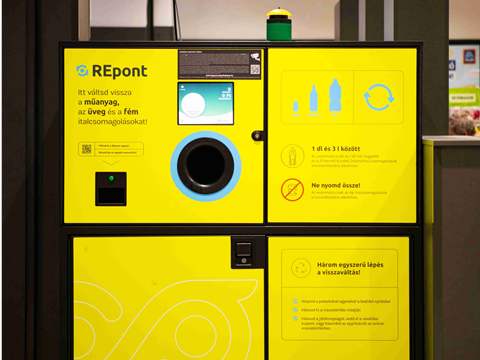
Aldi Hungary reports that consumers have returned around 140 million items of single-use packaging via in-store REpont machines, equating to a daily average of 3,000+ plastic, aluminium, and glass bottles per store.
Since the introduction of Hungary’s deposit return system (DRS) in January 2024, Aldi has introduced 246 REpont deposit return machines across its 183 Hungarian stores. Wherever possible, the machines are located in a separate room from the sales area to avoid inconveniencing other shoppers.
Now the retailer says that every eleventh bottle returned under the nationwide DRS is returned to an Aldi store. Apparently, some of its locations receive up to 10,000 items of beverage packaging every day, but its overall average is more than 3,000 bottles daily.
Within that figure, it calculates that 58% of the returned bottles are made of PET. Around 36% are made of aluminium, while 6% are made of glass.
Aldi asserts that it has continuously expanded the amount of its product packaging registered in the DRS system and redeemable at any Repoint. Right now, it places the figure at around 870 products, but says the figure keeps increasing with new seasonal and promotional products.
While around 84% of consumers are thought to request that their deposit be returned through an in-store voucher, this number is believed to be decreasing. The remaining consumers are opting for their deposit to be transferred via the REpont app.
Nearly one-sixth of consumers ask for their money to be transferred to their bank account, while 0.35% direct it to a charity. However, Aldi adds that ‘many people’ opt to scan a QR code from a non-profit organization to request a deposit return.
Other national DRS have reported high collection rates; Pantamera reports that 2.8 billion PET bottles and aluminium cans were returned in Sweden last year, correlating to an average of 271 containers returned per person, while Sensoneo says that over 1 billion containers have been collected via Ireland’s DRS so far.
In the UK, Aldi and Ocado’s refillable packaging trials – conducted as members of GoUnpackaged’s Refill Coalition – reportedly achieved in-store refill rates of up to 57%. It is believed that 86% of vessels were returned without deposit incentives, while life cycle assessments indicate that the refillables exceed the environmental performance of single-use in only two cycles.
If you liked this story, you might also enjoy:
The ultimate guide to the Packaging and Packaging Waste Regulation in 2025
How are the top brands progressing on packaging sustainability?
Everything you need to know about global packaging sustainability regulation in 2025
The key to increasing the use of reusable packaging in supermarkets













No comments yet